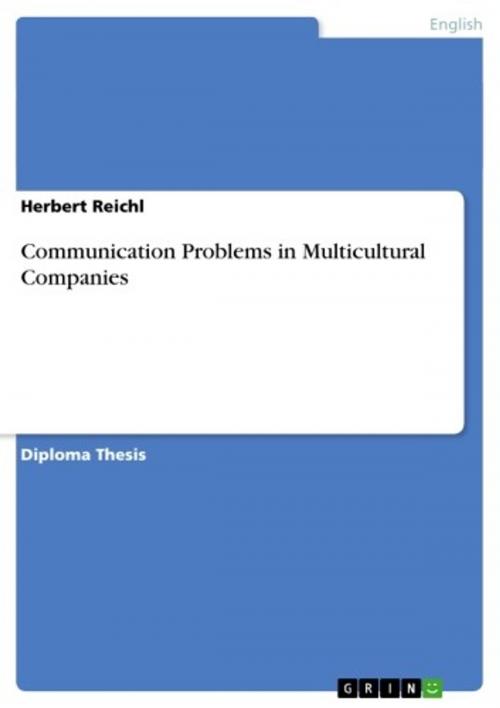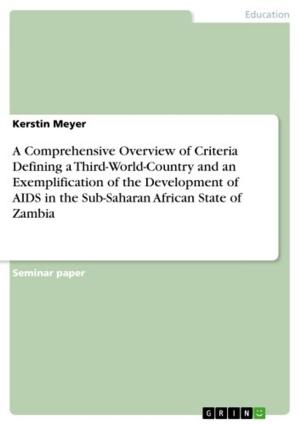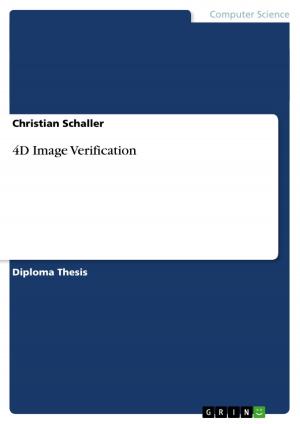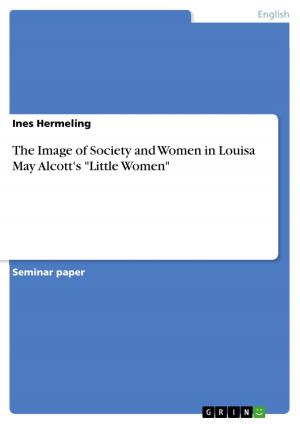Communication Problems in Multicultural Companies
Nonfiction, Reference & Language, Study Aids, ESL, Foreign Languages| Author: | Herbert Reichl | ISBN: | 9783638167864 |
| Publisher: | GRIN Publishing | Publication: | January 29, 2003 |
| Imprint: | GRIN Publishing | Language: | English |
| Author: | Herbert Reichl |
| ISBN: | 9783638167864 |
| Publisher: | GRIN Publishing |
| Publication: | January 29, 2003 |
| Imprint: | GRIN Publishing |
| Language: | English |
Diploma Thesis from the year 2002 in the subject English Language and Literature Studies - Culture and Applied Geography, grade: very good, University of Salzburg (Anglistics-American Studies), 46 entries in the bibliography, language: English, abstract: Although I have never been a regular viewer of 'Star Trek' and thus would not con¬sider myself a 'Trekkie', I have chosen this quotation as a starting point as it very well ex¬presses the problem I will deal with in the following paper: being different in terms of culture, language, education, or social status. I have also chosen the above quotation because of its second line as it suggests a produc¬tive way of dealing with the difficulty of being different. Be it in a thousand years or in the present time, we have to find solutions to the problems that arise when people coming from totally different cultural or social backgrounds meet and have to live together. In the course of my studies at the University of Salzburg, I have come across a broad variety of topics related to the field of Linguistics. Among others, I dealt with the linguistic terminology at the beginning of our studies, some varieties of English, their main features, with Psycholinguistics, or with language acquisition but to name a few. However, one main topic of Linguistics that has always had a special attraction to me was the field of Sociolin-guistics. It has been interesting to hear how speakers' cultural or social background, age, gen-der, or education, have an influence on their register. Furthermore, it is also important that language always represents a certain status or the membership to a certain ethnic group and/or minority. Normally, people who speak a certain dialect are proud of that and it means more to them than just speaking it. It represents heritage, tradition, and sometimes nationalism for them. They simply want to be different in order to dissociate themselves from other ethnic groups with different dialects.
Diploma Thesis from the year 2002 in the subject English Language and Literature Studies - Culture and Applied Geography, grade: very good, University of Salzburg (Anglistics-American Studies), 46 entries in the bibliography, language: English, abstract: Although I have never been a regular viewer of 'Star Trek' and thus would not con¬sider myself a 'Trekkie', I have chosen this quotation as a starting point as it very well ex¬presses the problem I will deal with in the following paper: being different in terms of culture, language, education, or social status. I have also chosen the above quotation because of its second line as it suggests a produc¬tive way of dealing with the difficulty of being different. Be it in a thousand years or in the present time, we have to find solutions to the problems that arise when people coming from totally different cultural or social backgrounds meet and have to live together. In the course of my studies at the University of Salzburg, I have come across a broad variety of topics related to the field of Linguistics. Among others, I dealt with the linguistic terminology at the beginning of our studies, some varieties of English, their main features, with Psycholinguistics, or with language acquisition but to name a few. However, one main topic of Linguistics that has always had a special attraction to me was the field of Sociolin-guistics. It has been interesting to hear how speakers' cultural or social background, age, gen-der, or education, have an influence on their register. Furthermore, it is also important that language always represents a certain status or the membership to a certain ethnic group and/or minority. Normally, people who speak a certain dialect are proud of that and it means more to them than just speaking it. It represents heritage, tradition, and sometimes nationalism for them. They simply want to be different in order to dissociate themselves from other ethnic groups with different dialects.















